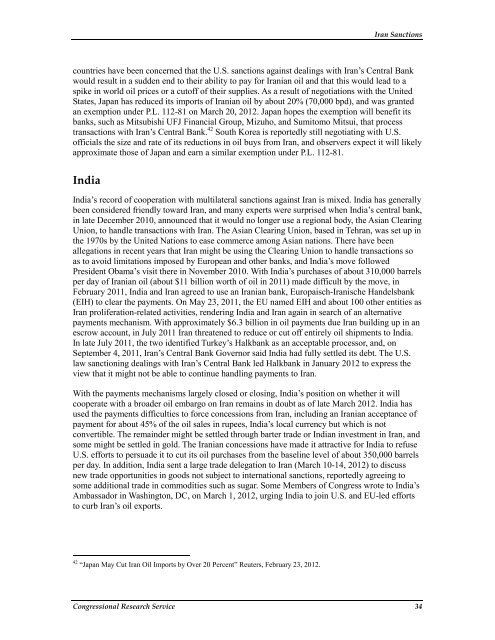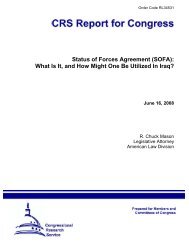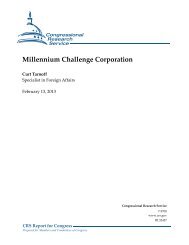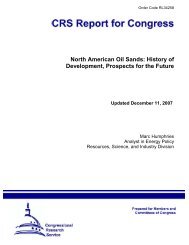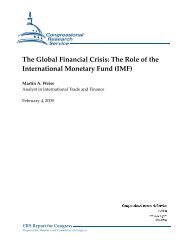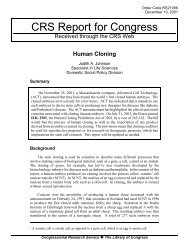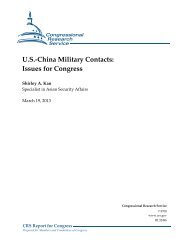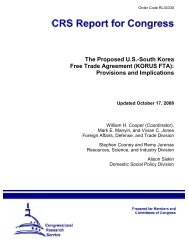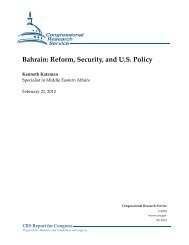Iran Sanctions - Foreign Press Centers
Iran Sanctions - Foreign Press Centers
Iran Sanctions - Foreign Press Centers
Create successful ePaper yourself
Turn your PDF publications into a flip-book with our unique Google optimized e-Paper software.
<strong>Iran</strong> <strong>Sanctions</strong><br />
countries have been concerned that the U.S. sanctions against dealings with <strong>Iran</strong>’s Central Bank<br />
would result in a sudden end to their ability to pay for <strong>Iran</strong>ian oil and that this would lead to a<br />
spike in world oil prices or a cutoff of their supplies. As a result of negotiations with the United<br />
States, Japan has reduced its imports of <strong>Iran</strong>ian oil by about 20% (70,000 bpd), and was granted<br />
an exemption under P.L. 112-81 on March 20, 2012. Japan hopes the exemption will benefit its<br />
banks, such as Mitsubishi UFJ Financial Group, Mizuho, and Sumitomo Mitsui, that process<br />
transactions with <strong>Iran</strong>’s Central Bank. 42 South Korea is reportedly still negotiating with U.S.<br />
officials the size and rate of its reductions in oil buys from <strong>Iran</strong>, and observers expect it will likely<br />
approximate those of Japan and earn a similar exemption under P.L. 112-81.<br />
India<br />
India’s record of cooperation with multilateral sanctions against <strong>Iran</strong> is mixed. India has generally<br />
been considered friendly toward <strong>Iran</strong>, and many experts were surprised when India’s central bank,<br />
in late December 2010, announced that it would no longer use a regional body, the Asian Clearing<br />
Union, to handle transactions with <strong>Iran</strong>. The Asian Clearing Union, based in Tehran, was set up in<br />
the 1970s by the United Nations to ease commerce among Asian nations. There have been<br />
allegations in recent years that <strong>Iran</strong> might be using the Clearing Union to handle transactions so<br />
as to avoid limitations imposed by European and other banks, and India’s move followed<br />
President Obama’s visit there in November 2010. With India’s purchases of about 310,000 barrels<br />
per day of <strong>Iran</strong>ian oil (about $11 billion worth of oil in 2011) made difficult by the move, in<br />
February 2011, India and <strong>Iran</strong> agreed to use an <strong>Iran</strong>ian bank, Europaisch-<strong>Iran</strong>ische Handelsbank<br />
(EIH) to clear the payments. On May 23, 2011, the EU named EIH and about 100 other entities as<br />
<strong>Iran</strong> proliferation-related activities, rendering India and <strong>Iran</strong> again in search of an alternative<br />
payments mechanism. With approximately $6.3 billion in oil payments due <strong>Iran</strong> building up in an<br />
escrow account, in July 2011 <strong>Iran</strong> threatened to reduce or cut off entirely oil shipments to India.<br />
In late July 2011, the two identified Turkey’s Halkbank as an acceptable processor, and, on<br />
September 4, 2011, <strong>Iran</strong>’s Central Bank Governor said India had fully settled its debt. The U.S.<br />
law sanctioning dealings with <strong>Iran</strong>’s Central Bank led Halkbank in January 2012 to express the<br />
view that it might not be able to continue handling payments to <strong>Iran</strong>.<br />
With the payments mechanisms largely closed or closing, India’s position on whether it will<br />
cooperate with a broader oil embargo on <strong>Iran</strong> remains in doubt as of late March 2012. India has<br />
used the payments difficulties to force concessions from <strong>Iran</strong>, including an <strong>Iran</strong>ian acceptance of<br />
payment for about 45% of the oil sales in rupees, India’s local currency but which is not<br />
convertible. The remainder might be settled through barter trade or Indian investment in <strong>Iran</strong>, and<br />
some might be settled in gold. The <strong>Iran</strong>ian concessions have made it attractive for India to refuse<br />
U.S. efforts to persuade it to cut its oil purchases from the baseline level of about 350,000 barrels<br />
per day. In addition, India sent a large trade delegation to <strong>Iran</strong> (March 10-14, 2012) to discuss<br />
new trade opportunities in goods not subject to international sanctions, reportedly agreeing to<br />
some additional trade in commodities such as sugar. Some Members of Congress wrote to India’s<br />
Ambassador in Washington, DC, on March 1, 2012, urging India to join U.S. and EU-led efforts<br />
to curb <strong>Iran</strong>’s oil exports.<br />
42 “Japan May Cut <strong>Iran</strong> Oil Imports by Over 20 Percent” Reuters, February 23, 2012.<br />
Congressional Research Service 34


